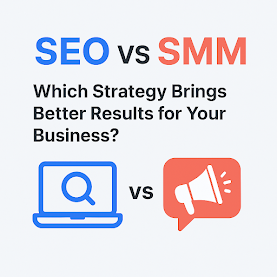
In today’s digital landscape, businesses are constantly seeking the best ways to boost online visibility and drive engagement. Two of the most powerful strategies are Search Engine Optimization (SEO) and Social Media Marketing (SMM). Both play unique roles in attracting potential customers, but understanding which delivers better results depends on your business goals, audience, and budget.
Understanding SEO
Search Engine Optimization (SEO) focuses on improving your website’s ranking on search engines like Google, Bing, and Yahoo. By optimizing keywords, meta tags, backlinks, and high-quality content, businesses can increase organic traffic and gain authority in their niche. SEO is a long-term strategy that helps attract users actively searching for your products or services, providing consistent traffic and better ROI over time.
Key Elements of SEO Include:
- On-page optimization: Titles, headers, and content structured for search engines.
- Off-page optimization: Backlinks, guest posts, and authority building.
- Technical SEO improvements: Site speed, mobile optimization, and structured data.
- Content marketing: Blog posts, videos, infographics that solve user problems.
Understanding SMM
Social Media Marketing (SMM) uses platforms like Facebook, Instagram, LinkedIn, Twitter, and TikTok to engage your audience. It is ideal for building brand awareness, increasing engagement, and generating leads quickly. SMM campaigns can be organic or paid, allowing businesses to target users based on demographics, interests, and behaviors.
Benefits of SMM:
- Rapid reach and visibility
- Direct engagement with potential customers
- Easy to track campaigns with analytics and metrics
- Supports brand storytelling and viral campaigns
Key Differences Between SEO and SMM
- Timeframe – SEO delivers long-term growth, while SMM produces quick visibility.
- Cost Efficiency – SEO requires initial investment but reduces dependency on paid campaigns. SMM can be costlier if relying heavily on ads.
- Targeting – SEO targets users actively searching for products or services, whereas SMM targets users based on demographics and interests.
- Analytics – SMM provides real-time engagement metrics, while SEO focuses on traffic trends and conversions over time.
Which Strategy Brings Better Results?
The choice between SEO and SMM largely depends on your business objectives. For long-term traffic growth and higher ROI, SEO is essential. For brand awareness, rapid lead generation, or viral campaigns, SMM provides immediate impact. Many successful businesses combine both strategies to maximize reach, engagement, and revenue. Integrating SEO-focused content with social media campaigns often produces the most effective results.
Conclusion
Choosing the right strategy requires understanding your business goals, target audience, and resources. SEO ensures long-term visibility, while SMM provides instant engagement.
A combined approach often delivers the best results, maximizing both organic growth and social reach.
Reach out to Venlax Group for expert SEO and SMM services to grow your online presence effectively.
Frequently Asked Questions
1. Can I use SEO and SMM together?
Yes, combining both strategies enhances visibility, engagement, and conversions.
2. Which is better for small businesses?
Small businesses benefit from SMM for immediate reach, but SEO ensures sustainable growth.
3. How long does SEO take to show results?
Typically, SEO results appear within 3-6 months depending on competition and optimization.
4. Is paid advertising part of SMM?
Yes, paid social media campaigns are an integral part of SMM strategies.
5. Can SMM increase website traffic like SEO?
Yes, SMM drives traffic through posts, ads, and influencer collaborations but usually with short-term spikes.